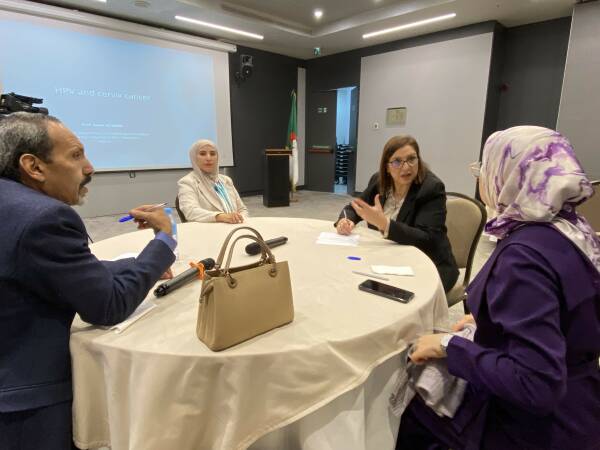Regional seminar boosts cervical cancer vaccination and early detection efforts.
-A regional media seminar was held in Algeria, with online participation from Tunisia, Lebanon, Oman, and Cairo,to review Arab and international efforts to eliminate cervical cancer and raise awareness about HPV risks.

Najwa Rahm
Algeria — Participants in the regional media seminar unanimously agreed that vaccination against the human papillomavirus (HPV) and early screening form the essential foundation for preventing cervical cancer and related diseases. They emphasized the need to strengthen cooperation among Arab countries to ensure that vaccines and screening services reach all targeted groups.
On Tuesday, November 18, a major regional media seminar was held in Algiers in person under the title “Breaking the Silence on Cervical Cancer”, with virtual participation from Tunisia, Lebanon, Oman, and Cairo. The event aimed to shed light on regional and international efforts to eliminate cervical cancer and raise awareness in Arab communities about the dangers of HPV infection and methods of prevention. The initiative was supported by MSD, with participation from local and international experts, along with a powerful testimony from a cervical cancer survivor and calls to expand vaccination and early detection programs.
The Egyptian experience in eliminating cervical cancer
Dr. Amal El-Sisi, Professor of Pediatrics and Technical Coordinator for Maternal and Child Health, presented an overview of Egypt’s experience and its efforts to adopt the International Day of Cervical Cancer Elimination. She stressed the importance of vaccinating 90% of girls before age 15 and conducting cervical screening for 70% of women aged 35–40.
She also shared data on HPV prevalence among both genders, noting that 7% of women carry the virus without symptoms, compared to 21% of men, while 80% of women are exposed at least once in their lifetime. She explained that HPV types 16 and 18 are the most cancer-causing, while types 6 and 11 lead to genital warts.
Dr. El-Sisi emphasized that the absence of vaccination and early screening contributes to rising cases of throat and pharyngeal cancers, oral cancer, and penile cancer, noting that globally about 600,000 new cervical cancer cases are recorded each year, with a mortality rate ranging between 50% and 60% due to late diagnosis. She stressed that vaccination, when taken according to recommended schedules, is an effective means of protecting both children and adults and preventing serious diseases.
A cervical cancer survivor from Egypt also shared her personal testimony, explaining that her illness was detected through early screening. She underwent treatment and a hysterectomy and received the HPV vaccine after recovery. She urged all women to commit to cervical screening and early detection.
The Reality of Early Detection in Algeria
Professor Asia Slimani, Head of the Department of Pathology at Beni Messous University Hospital, presented an overview of the state of early detection in Algeria. She noted that national programs face major challenges. In 2024, around 266,300 women underwent cervical screening, with 10% of Pap smears showing abnormal results, whereas the ideal rate should not exceed 5%. She pointed out that the age group most frequently screened was 40–44 years, even though screening is supposed to begin at a younger age. She also emphasized that these statistics do not include tests performed in university hospitals and private clinics, meaning the actual coverage may be much lower.
Key Challenges
She added that one of the most significant challenges is the absence of a national digital platform to track test results and facilitate follow-up, which reduces the effectiveness of screening programs. She also highlighted obstacles such as heavy pressure on public clinics, a shortage of colposcopy specialists—especially in the private sector—and the difficulty of accessing HPV testing in paid centers. “The ACP Center at Beni Messous University Hospital in the capital is the only facility that provides HPV testing for free,” she noted.

For her part, WHO Regional Consultant for Noncommunicable Diseases, Lamia Mahmoud, delivered a presentation on regional challenges and the importance of strengthening vaccination and early detection programs in the Arab world. She stressed the need for coordination among countries to ensure that vaccines and screening reach all target groups.
